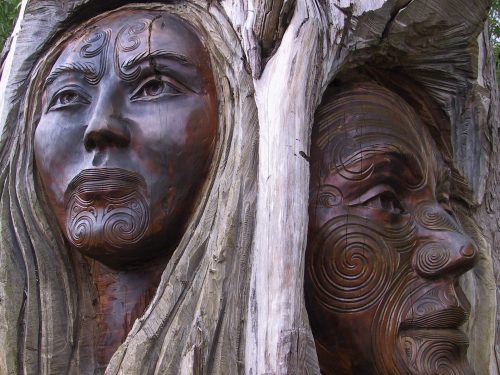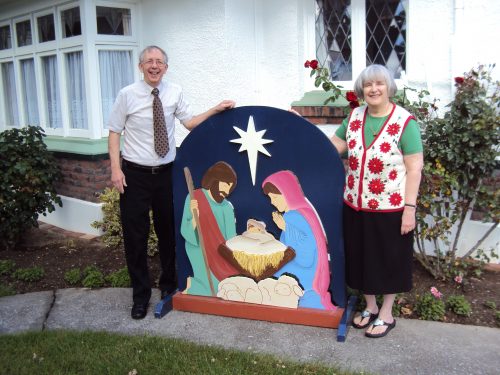
I’ve lived in New Zealand for 22 years and one part of the culture here is hard to pin down.
Maori people are the New Zealand natives who have been here for hundreds of years. The Maori culture comes with many stories about creation and other topics that come into their belief system. Europeans began to arrive about a hundred and fifty years ago, bringing Christianity with them. The two cultures have mixed together to become the New Zealand culture we have today. Some people borrow from both belief systems along their spiritual journey. Some don’t believe either one.
About 20 years ago, my husband did a funeral for a baby whose father identified strongly with the Maori culture and whose mother was a member of our church. Because Maori have many funeral traditions, planning the funeral brought us to the marae (Maori meeting place) to work out the details. We were welcomed onto the marae with a ceremony, touched our noses to theirs in the traditional Maori greeting, washed our hands and ate lunch with them there. They sang a Christian song and talked about being inclusive in their religion. But by the time we left we had unknowingly taken part in some traditions that had religious meaning that we had not intended.
In recent years New Zealand has been seeking to integrate the Maori culture and language (Te Reo) into the school system in a stronger way. Some aspects of the Maori culture, such as loyalty to family and community, are good concepts to teach to children. But teaching their ancestral stories to school children comes with some dangers. These stories are contrary to the Christian belief of one true God in heaven Who created all things.
I have known for years that children are taught Maori stories about creation in school. Many times I have asked New Zealanders, “Are these stories taught as fact or legend?” The answer always comes back the same. “The stories are just taught.” Even in early childhood education, children aged three to five may hear some of the Maori stories and learn about Maori “guardians.” How should a Christian parent feel about this? What should they do about it? How can the church prepare children for this?
This year I am planning to teach several sessions of Discovery Club that deal gently with some difficult subjects our children face in public school. We’ll talk about gender identity, race issues, and the what to believe about Maori creation stories. While preparing to teach about Maori stories I’ve given new effort to finding out the answers to these questions:
- Does the Maori belief system teach their creation stories as fact or as myth?
- Do Maori actually worship their spirits as gods?
To a Christian from a Western culture, these seem like sensible questions that should have straight-forward answers, but these answers aren’t easy to find. Because I’m dealing with the issue as it relates to students in the public school system, I wanted to find out what schools are expected to teach. I found this very helpful website which helps teachers to include Maori language and culture in their classroom. Their article on the Maori creation story helped answer my questions. I’m not an expert on these things, so I am basing my information on this website.
Are Maori creation stories taught as fact or myth?
In the beginning of my study I thought that surely educated Maori people today don’t really believe that the world was created in the way their stories are told. That Sky Father and Earth Mother separated to allow their children to leave the dark, cramped space they lived in. According to the story, their son Tane, God of the Forest, pushed Earth Mother downward so she would not see Sky Father’s sadness. Tane clothed her in trees and plants. Sky Father was pushed upward and Tane’s sweat from the exertion became the stars. Another god was so angry that he gouged out his eyes and threw them into the sky to become a star cluster. Maori people might like the story, but surely they don’t consider it to be scientific and factual.
I found the answer in this part of the article:
Examine how you approach the words “Myths” and “Legends”. If you use these words, make sure you understand what you are conveying.
Although the word myth has a dictionary meaning….”a traditional story of historical events that serves to unfold part of the world view of a people or explain a practice, belief or natural phenomenon”, it has become a word used for “unfounded or false notion”.
“Oh, that’s just a myth!”
Please examine your introduction of these whakapapa pūrākau (ancestral stories). I prefer to call them this rather than “Myths and Legends”.
Remember there may be tamariki (young people) in your class who consider these very strong whakapapa (ancestral) links.
As part of colonisation there has been a view that perhaps Māori pūrākau (stories) somehow have less value. ( We know better than that).
I don’t think I could have understood this answer without my experience as a missionary in Taiwan. As Americans in the 1980’s and 1990’s, we tried to show our unsaved students that the Bible’s view of creation and salvation were right because they were true. Why would you follow a religion or belief that wasn’t true? They were strangely unmoved by that argument. We grew to realize that Chinese culture doesn’t care a lot about absolute truth. Their culture has not come out of a culture that believes or emphasizes absolute truth. They care more about the question “Does it work?” than “Is it true?” They wanted to know if Christianity would help them prosper. That’s what they expected from their gods. If their gods didn’t help them, they would abandon their gods. They also worshipped their gods to fit into their family and community. Some even believed Christianity was true, but wouldn’t follow Christ because of the division it would cause in their family.
Fast forward to our ministry in New Zealand. With my Taiwan background in mind, I interpret the explanation above to mean this: It doesn’t really matter if the Maori stories about their gods are true, factual, or scientifically correct. The ancestral stories are important to the Maori culture and values. So they should not be considered inferior to European stories that are based on Christianity.
Do Maori actually worship their spirits and gods?
In Taiwan it is easy for us to see how people worshiped their gods and ancestors. On certain days of the lunar calendar our neighbors would set up tables outside their house. They might have a cooked chicken on the table, some fruit and beer on it. They would light incense sticks and maybe burn paper spirit money to the god or ancestor. Sometimes we would see a procession fill a street with worshippers carrying a god from one place to another. Certain holidays filled the temples. It didn’t seem to matter a lot what the worshipers thought or felt as they worshipped, but there was strong pressure from family and community to engage in the visible aspects of worship.
In New Zealand we don’t actually see Maori people worshiping gods in this kind of way. They do have rituals and blessings that are important to them on certain occasions. But if they aren’t actually worshiping false gods, should it matter to Christians if they share their religious stories?
Dangers in teaching Maori creation stories as significant to our lives.
-
Maori guardians are actually false gods, an important part of Maori beliefs.
Whether you call them gods, guardians, or atua (ancestors with influence over certain domains,) these stories are about false gods. The stories are similar to gods of Greek mythology and other gods that cultures have invented.
You see from the article that, among the Maori stories “there is considerable diversity among various … versions of the creation story.” While the various versions contradict each other, the story of God’s creation given in the Bible is always the same. Conflicting accounts of an incident can’t all be true. Christians believe, however, that the Bible gives a scientifically accurate, true account of what really happened at the beginning of time on planet earth. Bible history comes from actual events that really happened, not made-up stories.
People in Bible times often believed in false gods whose history came entirely from made-up stories. At times they sacrificed their babies to these gods or engaged in despicable practices like prostitution to appease these gods. In the Old Testament even God’s people, the Hebrews, worshiped these gods. God always condemned the worship of false gods and showed the foolishness of trusting in a made-believe deity. (Isaiah 44:9-20)
-
Some use Maori stories to influence their lives.
Note the importance the Te Reo Maori Classroom article gives to the Maori creation story.
The Māori creation story and its tradition is so strong that it can influence all aspects of life. In this way customs, practices and institutions can become an expression of a culture’s foundation story. The essential elements of the Māori creation narrative influence many aspects of the Māori world view. These practices give us structure and support to live in a way closely aligned with our tīpuna (ancestors).
As Christians, our beliefs, who we are and what we do all need to be based on the Bible. (2 Timothy 3:17-6-17) When we allow other, conflicting beliefs to shape our thinking and decisions, we place ourselves on dangerous ground.
-
Non-biblical creation accounts rob our Creator God of His rightful glory.
Take a fresh look at Genesis 1 and 2. In six days our Creator God created everything on earth out of nothing. He created mature plants, animals, and people who were able to reproduce from the beginning. All life on earth today comes from God’s creation some six thousand years ago. Nothing man can do comes close to this original act of creation by God.
When someone takes this incredible act of creation and changes the story to give credit to false gods that don’t even exist, that demeans God and His act of creation.
How can I help my children when they encounter teaching about Maori gods in their classroom?
You could try to have your child taken out of class when these stories are taught. You could complain to the teacher or principal that you don’t like to have these religious beliefs taught during the school day. But if you continue to educate your children in the public school system in New Zealand, you are going to face this issue. Here’s an approach that I believe can help you navigate your way through this situation.
You need to teach your children these things:
-
The truth about how the world began comes from the Bible.
Maori stories of creation and other stories of this kind are made-up stories. Different stories may share some common ideas but the details vary widely. Since the stories are conflicting, they can’t all be true.
Today’s scientists also continue to offer theories about how the world and its universe came into being. Some scientists today say the earth is estimated to be 4.54 billion years old, plus or minus about 50 million years. Since their dating of the beginning of world changes constantly, by millions of years at a time, you can tell their dating methods are unreliable. Scientists are also constantly changing their theories about how the earth evolved. As new evidence comes to light, the theories constantly change to accommodate the evidence. Many non-Christian scientists readily admit that the theory of evolution has problems and they don’t know how the earth came into existence. Evolutionists have never been able to explain two questions. 1. If the earth is the result of an explosion of very dense matter, where did the first matter came from? 2. Where did the first life come from?
The Bible, on the other hand, teaches the true history of the beginning of the earth. God, the only eye witness to creation, revealed this to man. The Bible is a reliable source of history backed up by historical evidence. The creation details don’t change because the account of creation is true and accurate. For more about the reliability of creation stories from the Bible versus other creation stories see this article.
The Bible gives us the only authoritative truth about how our world began.
-
Some stories are made-up and aren’t meant to be true.
The story of the ant and the grasshopper is clearly not true. Ants and grasshoppers don’t talk to each other. In some versions of this story the grasshopper plays the fiddle and dances, which is scientifically impossible. The story is clearly a make-believe one which teaches us a good lesson. In the same way, the Maori creation stories are stories which were made up to explain the beginning of the world. They aren’t scientifically true. They are just stories.
Santa Claus, the Easter Bunny, and the Grinch that Stole Christmas are examples of other made-up stories. Of course, if you tell your children that Santa Claus is a true story, at some point you will have to admit you lied about this. Your children may realize they can’t trust your word. I believe Christian parents need to tell the truth from cradle to grave to their children and model a clear distinction between truth and make-believe or falsehood.
-
Even when we disagree with people, we need to treat them with respect.
When it comes to Maori stories they learn in school, students should be allowed to say to their friends that they believe the stories are make-believe, that the Bible gives the true creation story. They should be allowed to say the same thing to teacher on the side. But it wouldn’t be respectful to speak up in front of the whole class and tell the teacher that the stories are false and they shouldn’t have to study them.
*Special thanks to The Te Reo Maori Classroom website for their helpful article on Maori creation stories.
Here’s a short summary of the Maori creation story.





